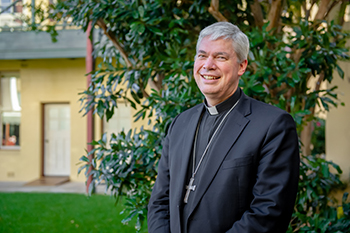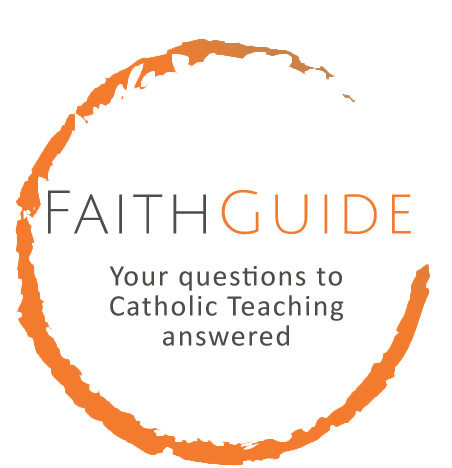Viewed as a life-changing tool with seemingly limitless possibilities, artificial intelligence (AI) is on the minds and lips of many today, including people of faith.
While some are fascinated by the rise of the technology, others are more cautious and nervous, particularly with regulators struggling to keep up with the pace of its development.
 Sydney Auxiliary Bishop Richard Umbers has kept a keen eye on the rise of AI technology and says users should be aware of its limitations.
Sydney Auxiliary Bishop Richard Umbers has kept a keen eye on the rise of AI technology and says users should be aware of its limitations.
“Technology is made by humans for humans, so there’s always an ethical component to technology, it’s never purely neutral,” he explained.
“You have to be attentive to the fact that what might seem like something very scientific and objective starts with a number of biases from the people who set it up in the first place.”
The development of AI technology has been rapid, as has been the speed at which the public has embraced it. ChatGPT, the most well-known AI tool, launched in November 2022, and took just two months to reach 100 million monthly active users, becoming the fastest-growing consumer application the world has seen[i].
ChatGPT allows users to request virtually any information they wish – such as a sample letter, an article summary, an academic essay, or a homily – and delivers the information instantly.
Bishop Umbers said the technology has its uses, but also has limitations.
“ChatGPT is terrible for homilies; it’s OK for research,” he said. “In general, it will be quite orthodox, but like anything, when you try to preach you have to make it your own. Otherwise, you might be erudite, but you’ll be boring, and you’ll fail to move.”
Catholic organisations have already braved the new AI world, looking to utilise its capabilities to help bring people to a greater understanding of the Catholic faith.
Majellan Media, a ministry of the Redemptorists of Oceania, launched FaithGuide in July 2023, an AI tool that provides answers to questions about Catholic teaching.
Majellan’s CEO Tony Biviano said FaithGuide developed over a few months as a modern way of embracing technology and “reaching the unchurched”.
“People are living a lot more of their lives online; technology is invading all of life, so that’s why we got interested in AI,” he said. “We wanted to make it easy and convenient for people to find out about the Church and about faith.”
FaithGuide requires users to simply enter a word or phrase, before a response is generated, using the Catechism of the Catholic Church and the Code of Canon Law as references.
 Mr Biviano said FaithGuide users provided helpful feedback on the tool in its early days, which has been used to refine it slightly. He said the overall response to FaithGuide had been positive, and that Majellan was working on other AI tools to release in the near future.
Mr Biviano said FaithGuide users provided helpful feedback on the tool in its early days, which has been used to refine it slightly. He said the overall response to FaithGuide had been positive, and that Majellan was working on other AI tools to release in the near future.
“We’ll have a similar app to FaithGuide on the Mass; and another one that we’re working with a school on puts together a prayer service or a liturgy,” he said. “We’re only limited by our imagination.”
In the US, Magisterium AI seeks to serve a similar purpose as FaithGuide, although it references a much larger number of Church documents – more than 5,700 at January 2024.
While producing a wealth of information instantly has its benefits, Pope Francis, who has written about AI in two separate messages this year, has warned of mistaking ‘knowledge’ for ‘wisdom’, which he says, “cannot be sought from machines”.
“Their great possibilities for good are accompanied by the risk of turning everything into abstract calculations that reduce individuals to data, thinking to a mechanical process, experience to isolated cases, goodness to profit, and, above all, a denial of the uniqueness of each individual and his or her story. The concreteness of reality dissolves in a flurry of statistical data,” he wrote in his message for this year’s World Day of Social Communications.
While some commentary on AI has looked at the myriad of hypothetical scenarios the future might hold, Bishop Umbers says people shouldn’t be fearful or anxious.
“It’s difficult for us to imagine life prior to the smartphone but it wasn’t that long ago,” he says. “I don’t know if we thought we’d have the world in our pocket, but we do.
“We shouldn’t be any more concerned about AI than we are about anything else going on in the world. But we should certainly be concerned about the big impacts that AI has on the marginalised and the poor.”
Indeed, this concern for the poor and marginalised was highlighted in Pope Francis’ message for the 57th World Day of Peace. The Pope writes that new information technologies offer “exciting opportunities”, but also come with “grave risks, with serious implications for the pursuit of justice and harmony among peoples”.
“We cannot presume a priori that its development will make a beneficial contribution to the future of humanity and to peace among peoples,” he writes. “That positive outcome will only be achieved if we show ourselves capable of acting responsibly.”
To help guide AI’s development, Pope Francis has also encouraged a “cross-disciplinary dialogue” on the ethics of new technologies, as well as the adoption of a “binding international treaty” regulating the development and use of artificial intelligence.
“In the end, the way we use it to include the least of our brothers and sisters, the vulnerable and those most in need, will be the true measure of our humanity,” he says.
Links
Message for the 58th World Day of Social Communications - Artificial Intelligence and the Wisdom of the Heart: Towards a Fully Human Communication (January 24, 2024)
Message for the 57th World Day of Peace – Artificial Intelligence and Peace (December 8, 2023)
Delving into the relationship between AI and humanity (Archdiocese of Hobart)
EWTN Video Series: Artificial Intelligence and the Catholic Church
[i] https://www.reuters.com/technology/chatgpt-sets-record-fastest-growing-user-base-analyst-note-2023-02-01/
Images: Australian Catholic Bishops Conference
Words: Matthew Biddle



